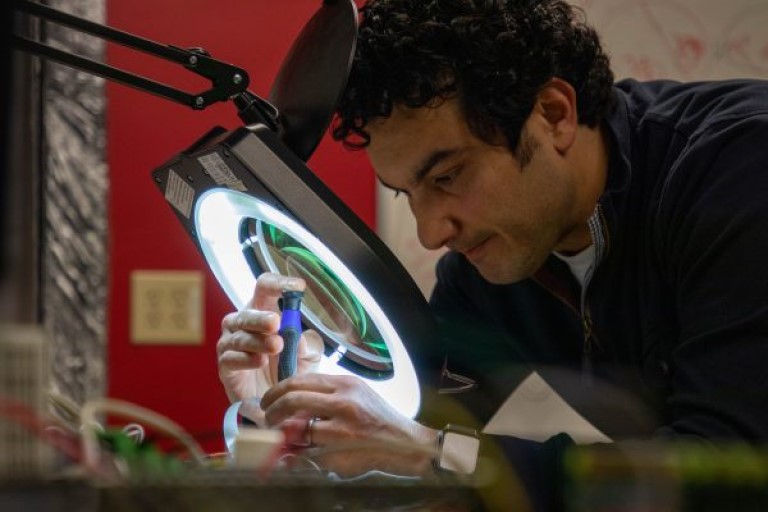With so much competition in the global marketplace, it’s critical for companies in Indiana and throughout the country to find the competitive advantage that sets them apart from others who may offer similar products and services.
IU’s Amrou Awaysheh, an associate professor of operations and supply chain management in the Kelley School of Business, has been working diligently to help companies around the globe become more competitive in a key area – business sustainability.
“Companies need sustainability to have a seat at the table, so businesses who ignore business sustainability, or who don’t understand its impact, do so to their own detriment,” Awaysheh said. “People think businesses contribute to climate change negatively, but I think businesses can be a force for good and still make money. And that, in a sense, makes them more sustainable financially.”
As the executive director of IU’s Sustainability and Business Innovation Lab, Awaysheh works with IUPUI students to help spread the message of the business value of sustainability, while helping people understand the positive business impacts that sustainability can have. He does this by training and empowering his students to look at topics across disciplines and to think outside the box to find solutions that can have a lasting impact.
“This is research where we can truly put the student front and center, which highlights and showcases the excellent talent pipeline coming out of IUPUI and IU, and it gives our students experiential learning opportunities where they are on the front line talking to managers and putting policies in place,” Awaysheh said. “Students are empowered to leverage the skills they built up during their time here in order to help solve real world problems. With sustainability, they are working to solve something that will have a lasting impact on all of us for many years to come.”
Awaysheh said that’s especially important in Indiana, which he pointed out will have one of the largest solar farms in the country upon completion in 2024. Now, he said, is the opportunity for Hoosiers to make business sustainability a competitive advantage, while making companies more profitable in the process.
“Five years ago, people thought sustainability collided with businesses, and now it’s clear that as a state, we’re looking to attract more outside investment, and those outside companies want things like renewable energy in our grid and more of a positive impact on the environment,” he said. “As a state, we must continue to invest in these things in order to be more competitive and attract more outside investment in our companies.”
The IU Sustainability and Business Innovation Lab is engaged in various projects to better understand the mechanisms that companies can do to have a more positive impact on the environment and their workforce, while recognizing the full business value of that. Researchers are examining a variety of topics such the impact of reducing water consumption or trying to understand the impact of using renewable energy on energy efficiency.
A specific element of sustainability that Awaysheh has looked at in depth is energy efficiency. This work has helped over 20 companies and over 1,000 factories globally improve in this area. In 2019, he founded the IU Internet of Things (IoT) Energy Efficiency Lab to help companies realize the value of investing in Industry 4.0 technologies to become more energy efficient in their factories.
Awaysheh and others in the lab work with manufacturers to attach smart meters to their machinery to monitor and understand energy performance within the factory and to see how certain machines use energy. The hope, he said, is to have a positive impact on sustainability because the less energy used means less carbon is emitted, which is better for the world.
This approach allows companies to essentially digitize their factories, providing a visual representation, in real time, of what individual machines are doing. Awaysheh and his students help companies understand where the digital meters should be placed and the impact to expect – which could mean major cost savings for companies.
“United States manufacturing consumes over $800 billion worth of energy annually,” Awaysheh said. “We have proven with our energy reduction technologies that you can save about 8 to 10-percent of energy consumption, meaning even at the lower end, that’s $60 billion in savings by doing simple things like turning off the machine when it’s not needed. Manufacturers need to understand and implement this, which will make U.S. manufacturing more competitive in the global marketplace.”

